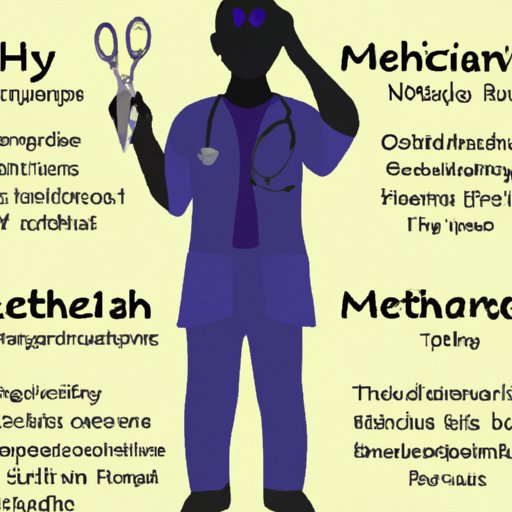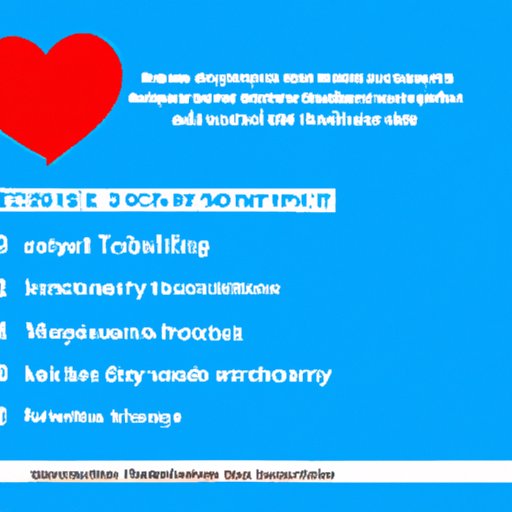Overview of a Mental Health Technician’s Role and Responsibilities
A mental health technician is an important member of the healthcare team who helps provide care to individuals with mental health issues. They work with patients to identify their needs, administer tests and assessments, and provide support services. The role of a mental health technician is essential to providing quality mental health care.
Definition of Mental Health Technician
A mental health technician is a professional who works with individuals who are dealing with mental health issues. They provide care and support to people suffering from depression, anxiety, psychosis, and other mental disorders. Mental health technicians typically work in hospitals, clinics, or community-based facilities. They are often supervised by psychiatrists, psychologists, or other mental health professionals.

Types of Mental Health Technicians
There are several different types of mental health technicians, each with their own unique responsibilities. Mental health technicians may specialize in one particular area, such as working with children or adolescents, or they may provide general care for all types of mental health issues. Some mental health technicians may also specialize in providing crisis intervention services or helping with substance abuse problems.
Responsibilities of Mental Health Technicians
Mental health technicians have a variety of responsibilities, including:
- Working with patients to identify their needs and provide appropriate care
- Administering tests and assessments to diagnose mental health issues
- Providing counseling and support services to help patients manage their mental health
- Monitoring patient progress and providing feedback to mental health professionals
- Educating patients and their families on mental health issues and treatment options
Exploring the Day-to-Day Activities of a Mental Health Technician
Mental health technicians are involved in a variety of day-to-day activities. These can include:
Working with Patients
The primary responsibility of a mental health technician is to work with patients to identify their needs and provide appropriate care. This includes assessing the patient’s mental health status and providing counseling and support services. Mental health technicians may also help develop treatment plans and monitor patient progress.
Administering Tests and Assessments
Mental health technicians may administer tests and assessments to diagnose mental health issues. They may also use these tests to help determine the best course of treatment for the patient. Mental health technicians must be knowledgeable about the various tests and assessments available and how to interpret the results.
Providing Support Services
Mental health technicians provide a variety of support services to help patients manage their mental health. This can include providing emotional support, helping with lifestyle changes, and providing information about resources and services available in the community. Mental health technicians may also facilitate group therapy sessions or provide case management services.

Examining the Education and Training Requirements for Mental Health Technicians
Mental health technicians must meet certain educational and training requirements in order to work in this field. These requirements vary depending on the type of position and the state in which the technician will be working.
Required Education
Most mental health technicians need to have at least a two-year degree in psychology, social work, or a related field. In some cases, a bachelor’s degree may be required. Mental health technicians should also have knowledge of basic medical terminology and anatomy.
Professional Certifications
In addition to a degree, mental health technicians may need to obtain professional certifications. Depending on the state, this may include becoming certified as a mental health technician, a psychiatric technician, or a mental health nurse. Certification requirements vary, but typically include passing an exam and completing a set number of hours of clinical experience.
Continuing Education
Mental health technicians must participate in continuing education courses in order to stay up-to-date on the latest developments in the field. This may include attending conferences, taking online courses, or completing workshops.
Exploring the Job Outlook and Salary of Mental Health Technicians
The job outlook for mental health technicians is positive, with employment expected to grow faster than average over the next decade. The median annual salary for mental health technicians is around $42,000 per year.
Employment Opportunities
Employment opportunities for mental health technicians are expected to grow 16% between 2020 and 2029, according to the U.S. Bureau of Labor Statistics. This is faster than the average growth rate for all occupations. The demand for mental health technicians is expected to increase as more people seek mental health services.
Salary Range
The median annual salary for mental health technicians is around $42,000 per year. Salaries can vary based on experience, location, and other factors. Mental health technicians may also receive additional benefits, such as health insurance, paid vacation time, and retirement savings plans.

Highlighting the Benefits of Working as a Mental Health Technician
Working as a mental health technician offers many benefits. Not only is it a rewarding career that can make a difference in people’s lives, it also offers job security and potential for career growth.
Enhancing Lives
One of the most rewarding aspects of working as a mental health technician is the ability to enhance the lives of those you serve. Mental health technicians provide essential care and support to individuals who are struggling with mental health issues. This can include providing counseling and support services, helping with lifestyle changes, and educating patients and their families about mental health.
Opportunities to Make a Difference
Mental health technicians have the opportunity to make a real difference in the lives of those they serve. They can help patients understand their mental health issues and provide them with the tools and resources they need to cope and manage their symptoms. Mental health technicians also play an important role in advocating for better mental health services and awareness.
Career Growth Potential
Working as a mental health technician provides the potential for career growth. With experience, mental health technicians can advance to higher positions such as clinical supervisors, case managers, or program directors. Mental health technicians may also choose to specialize in a particular area, such as child and adolescent mental health or geriatric mental health.

Case Study: The Impact of Mental Health Technicians on Mental Health Services
A recent study conducted by the University of California, San Francisco examined the impact of mental health technicians on mental health services. The study looked at the experiences of mental health technicians and the challenges they face in providing care. The findings revealed that mental health technicians play a critical role in providing quality mental health services and are essential to meeting the needs of patients.
Background of the Study
The study was conducted by researchers at the University of California, San Francisco. The researchers interviewed mental health technicians to gain insight into their experiences and the challenges they face in providing care. The study focused on the impact of mental health technicians on mental health services, including their roles, responsibilities, and challenges.
Findings of the Study
The study found that mental health technicians are essential to providing quality mental health services. They provide important care and support to patients, including administering tests and assessments, providing counseling and support services, monitoring patient progress, and educating patients and their families. The study also revealed that mental health technicians face numerous challenges in providing care, including limited resources, lack of support, and inadequate training.
Implications of the Study
The findings of this study suggest that mental health technicians are an integral part of the mental health care team. They play an important role in providing quality care and support to patients. The study also highlights the need for improved resources and training for mental health technicians in order to better meet the needs of patients.
Conclusion
Mental health technicians are an essential part of the healthcare team, providing care and support to individuals with mental health issues. They work with patients to identify their needs, administer tests and assessments, and provide support services. Mental health technicians need to meet certain educational and training requirements in order to work in this field. The job outlook for mental health technicians is positive, with employment expected to grow faster than average over the next decade. Working as a mental health technician offers many benefits, including the opportunity to make a difference in people’s lives and potential for career growth.
(Note: Is this article not meeting your expectations? Do you have knowledge or insights to share? Unlock new opportunities and expand your reach by joining our authors team. Click Registration to join us and share your expertise with our readers.)
